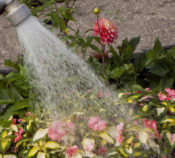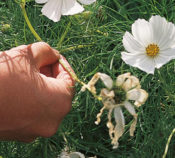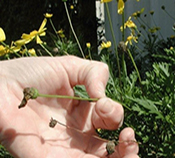Healthy Annuals for Your Commercial Property
Annuals are hardy and easy to care for if maintained properly. They will provide you a lush colorful display all season long. Here are some helpful tips to ensure your annual display lives up to its potential.
Tips for Taking Care of Annuals

Watering is Key
Thirsty flowers can’t sustain their luster for long. Most annuals require watering daily, especially if they are planted in full sun. Annuals are most susceptible to drying out in the first few weeks after planting.
Deep infrequent watering is preferred over frequent light watering so make sure your landscaper waters the soil, not the plants. Generally providing about one inch of water per week is sufficient. Heat can leave annuals wilting every afternoon, but giving them a deep soaking in the early morning hours will prepare them to handle the afternoon sun.

Mulching for Moisture
Mulch is not only attractive, it suppresses weeds, conserves moisture and prevents many soil-borne diseases. By keeping the soil cool and acting as a protective layer against evaporation, mulching cuts down on the amount of water needed.

Weeding Out the Competition
Weeding is an essential process when you are trying to achieve a beautiful annual display. Weeds use up the same air, moisture, and nutrients that your annuals desperately need. And if you add mulch after removing the weeds it will help retard future weed growth. As your annuals mature they will fill in and shade the soil surface helping to slow down the growth of weeds.

Deadhead Flowers to Thrive
Deadheading is the process of removing spent flowers to allow for new ones to emerge. It can be done by pinching or cutting the old flowers off with small shears. Clipping or pinching out the old flowers helps plants remain attractive, prevents disease, and keeps plants from going to seed. Not all annuals require this process to provide full color blooms all summer, but it can be especially helpful for Petunias, Geraniums, Salvia and Marigolds.

Pinching Foliage Promotes Density
Nipping off the tips of the stems forces side growth; making plants more dense and compact. Pinching encourages branching at the base resulting in more bloom potential. Petunias are a good candidate for this especially if they have gotten tall and floppy. Ask your landscaper to prune your plants mid-summer if they are starting to look leggy or ragged.
Annuals add a great pop of color to your commercial property but they do need care to thrive. If you’d like to get a proposal from Complete Landscaping Service, contact us.
This blog is part 1 of a series. Read Part 2 here – Fertilizing Annual Plantings






